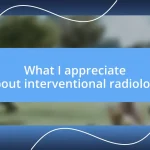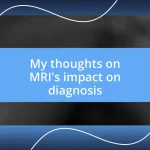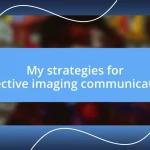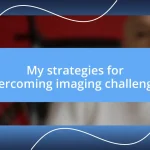Key takeaways:
- Next-generation sequencing (NGS) and PCR are crucial genetic diagnostic tools that enhance understanding of hereditary conditions and enable informed health discussions.
- Choosing the right genetic tests involves considering family history, symptoms, consultation with experts, and financial implications to tailor the experience towards relevant results.
- Integrating genetic test results into health decisions empowers individuals to make informed lifestyle changes, backed by open communication with healthcare providers and continued learning about advancements in the field.

Understanding genetic diagnostics tools
Genetic diagnostic tools are fascinating because they empower us to unlock the mysteries of our DNA. I remember the first time I encountered a genetic testing report—there was something almost surreal about seeing my genetic predispositions laid out before me. It made me wonder, how much of our health and identity is truly written in our genes?
One of the most common tools is next-generation sequencing (NGS), which allows for the rapid sequencing of entire genomes. It’s like holding a magnifying glass over our genetic material, revealing nuances we wouldn’t have understood otherwise. When I received my NGS results, it felt like diving into a treasure chest of information; suddenly, I had insights into hereditary conditions that I could discuss with my healthcare provider.
Another key player is PCR (polymerase chain reaction), which amplifies tiny segments of DNA for testing. I recall a recent discussion with a friend who had undergone PCR for a suspected genetic disorder. The tension in the room was palpable as we waited for the results. It made me appreciate how these tools not only provide clarity but also carry emotional weight, affecting families and communities in profound ways. How do we prepare ourselves for such revelations? That’s something I continually reflect on in my journey through genetic diagnostics.

Choosing the right genetic tests
Choosing the right genetic test can feel overwhelming, especially with so many options available. I remember a time when I was trying to decide between a broad panel test and more targeted testing for specific conditions. It taught me the importance of understanding my family’s medical history—each decision I made felt a bit like piecing together a puzzle. Knowing what to test for can tailor the entire experience, leading to more relevant results.
Here are some considerations that helped me when choosing the right genetic tests:
– Family history: Understanding the health issues that have affected my relatives significantly guided my choice.
– Specific symptoms: I found that correlating any existing symptoms with certain tests made my decisions clearer.
– Consultation: Speaking with a genetic counselor was invaluable; their expertise turned my uncertainty into clarity.
– Type of information: I considered how much detail I needed—sometimes less is more, especially if it means avoiding unnecessary anxiety.
– Cost and insurance: I learned to evaluate the financial aspects; knowing which tests were covered can alleviate stress in what can be an emotionally taxing journey.
By leveraging these insights, I realized that choosing the right genetic test is personal and often involves both emotional and practical considerations.

Interpreting genetic test results
Interpreting genetic test results can be both enlightening and daunting. I remember the moment I unfolded my own results; it was intriguing yet overwhelming. As I stared at the numbers and technical jargon, I felt a mix of excitement and anxiety—what did this all mean for my health and my future? Understanding the context of these results is crucial. They tell a story, one that’s intertwined with family history and potential medical conditions.
Often, the language used in genetic reports can feel like an entirely different dialect. I found it helpful to have a trusted healthcare professional by my side when discussing the findings. They helped translate the results into practical terms, relating them to my lifestyle and family history. For example, when I learned that I had a variant associated with a higher risk for a condition, it sparked a conversation about proactive health measures and lifestyle changes I could adopt. Isn’t it enlightening when numbers on a page lead to actionable insights?
| Result type | Interpretation |
|---|---|
| Positive | Increased risk or presence of condition |
| Negative | No evidence found for tested conditions |

Communicating findings with healthcare providers
Communicating findings with healthcare providers has always been key to me. I remember a particularly challenging conversation where I had to relay the details of my genetic test results to my doctor. It felt a bit like walking a tightrope—balancing between fear and hope. I learned the value of preparing beforehand; jotting down my concerns and questions helped ensure that nothing important was overlooked.
The dialogue needs to be open and collaborative. My experience taught me that I shouldn’t shy away from asking questions, no matter how basic they seemed. When I asked my provider to clarify certain points, it opened up discussions I hadn’t anticipated. For instance, when I expressed anxiety about a risk variant I found in the report, my doctor was able to discuss preventive measures and further testing options that eased my worries and felt empowering.
It’s essential to foster a partnership with healthcare providers. After sharing my findings, I felt compelled to ask how they would interpret my results in the context of my overall health plan. This exchange not only informed me about next steps but reinforced that I was an active participant in my health journey. The more I engaged, the clearer my path became—it’s amazing how communication can shape our understanding of health and risk!

Integrating results into health decisions
When I first integrated my genetic test results into my health decisions, it felt like stepping into uncharted territory. I vividly recall sitting at my kitchen table, armed with my report and a cup of herbal tea, contemplating the implications of my findings. Discussing my increased risk for certain conditions prompted me to rethink my diet and exercise routines. Has anyone else found themselves reevaluating daily choices just because of a piece of paper? It’s incredible how a set of results can spark profound lifestyle changes.
Engaging with my healthcare team about these results was a pivotal moment. I distinctly remember how a simple conversation about my genetic predisposition turned into a detailed discussion about preventive strategies that I never considered before. It was enlightening to hear my doctor say, “We can’t change your genes, but we can change how we respond to them.” This shift in perspective empowered me, reinforcing the idea that knowledge isn’t just power—it’s a roadmap for more informed health choices.
As I made these decisions, I realized that integrating genetic insights isn’t just about numbers and risks; it’s about tailoring my health journey. Reflecting on how my personal history intertwined with these results allowed me to feel more grounded in my approach to health. Have you ever felt that rush of clarity when you align your knowledge with your choices? It’s a transformative experience, one where every decision begins to feel intentional and guided by understanding rather than fear.

Staying updated on advancements
Staying updated on advancements in genetic diagnostics is essential, especially in such a rapidly evolving field. I remember the thrill of attending a genetics conference for the first time; I felt like a kid in a candy store. Listening to pioneering researchers share their latest findings and breakthroughs opened my eyes to what’s possible. It made me realize that every new discovery can significantly impact our understanding of genetic conditions and treatments.
I often turn to reputable online resources and journals to stay informed, but nothing beats personal interactions. Recently, I enjoyed a lunch with a genetic counselor who shared insights about cutting-edge testing technologies. The enthusiasm in their voice was contagious, and it struck me how vital it is to engage directly with professionals who are at the forefront of these advancements. Have you ever found inspiration in a conversation that shifted your perspective? I know I have, and it reinforces the notion that continuous learning is not just beneficial, it’s exciting.
Additionally, I’ve found social media to be a surprisingly rich source of information. Following experts and organizations dedicated to genetics allows me to receive real-time updates in my feed. I’ll never forget the moment I discovered a groundbreaking study on gene editing while scrolling through Twitter; it was like stumbling upon hidden treasure! This blend of traditional research and modern communication keeps me motivated and reminds me that I’m part of a larger community striving for better health outcomes through knowledge. How do you stay connected with the latest trends? It’s worth considering how diverse approaches can enrich our understanding and enthusiasm for this field.

Personal experiences and best practices
Navigating the world of genetic diagnostics has taught me invaluable lessons about self-advocacy. I recall a moment when I was discussing my results with a specialist who seemed overwhelmed by the intricate complexities of my case. I took it upon myself to dig deeper into the data, presenting my findings at our next appointment. It was empowering to take charge of my health, showcasing how an individual’s proactive approach can drive meaningful conversations with healthcare providers. Have you ever felt the urge to dive into your own data to spark important discussions?
Another important practice has been the use of genetic support groups. Joining a community of individuals with shared experiences has not only provided me with emotional support but also practical tips that I might not have uncovered on my own. I remember during one of our meetings, someone shared how they managed anxiety after learning about their genetic risks. Their honesty resonated with me and encouraged me to explore mindfulness techniques to cope with my own feelings. How does sharing our experiences help us process difficult information? It struck me that these connections create a safety net of collective wisdom.
Lastly, I’ve embraced the concept of setting realistic health goals based on my genetic insights. Early on, I set ambitious targets for lifestyle changes, but I quickly realized that it’s about progress, not perfection. I vividly remember celebrating small victories, like cooking a new healthy recipe instead of defaulting to takeout. Each tiny shift felt like a stepping stone toward long-term health. Have you found that celebrating the little achievements can boost your motivation? Acknowledging my progress has made the journey not just about the destination but about enjoying each moment along the way.














